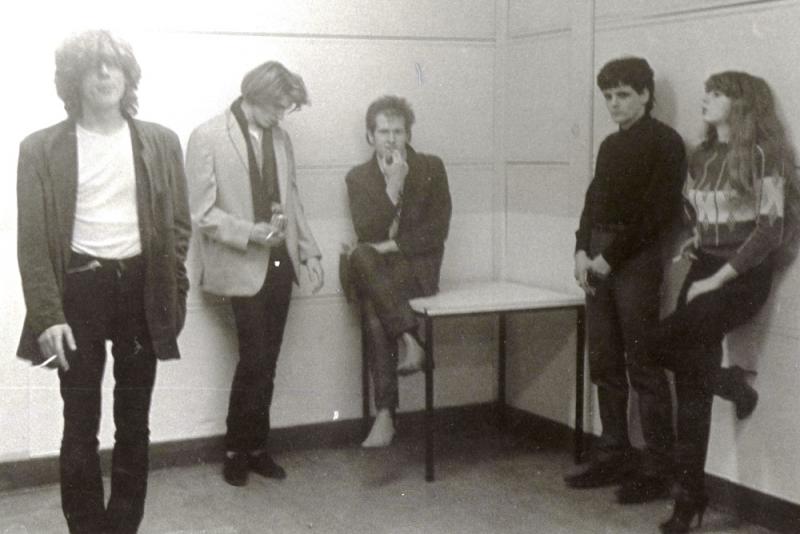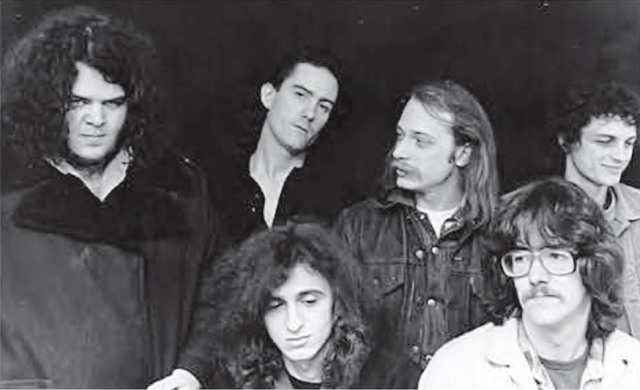Music Reissues Weekly: Fame - Jon Savage’s Secret History Of Post-Punk (1978-81) | reviews, news & interviews
Music Reissues Weekly: Fame - Jon Savage’s Secret History Of Post-Punk (1978-81)
Music Reissues Weekly: Fame - Jon Savage’s Secret History Of Post-Punk (1978-81)
Exploratory communiqués from punk’s slipstream

“The Method” by The Method Actors was issued as the top side of a single in July 1981. Although recorded in London during September 1980 and only released by a British label, the band – a duo of guitar/vocals and drums/vocals – were from Athens, Georgia.
It didn’t get much attention at the time but its wandering guitar figure, blurry, hard to parse vocals, splashy drums and unyielding forward motion bear a striking resemblance to the early R.E.M., whose first single “Radio Free Europe” was also in shops in July 1981. The shops where they came from – which also happened to be Georgia.
 Chicken and egg situations are usually irresolvable, but it’s impossible to avoid the feeling that before their British venture The Method Actors must have impacted on the nascent R.E.M. This is made manifest by the inclusion of “The Method” on the literally titled double album Fame - Jon Savage’s Secret History Of Post-Punk (1978-81). The word “fame” draws from the name of a fanzine which originated in Telford in 1979.
Chicken and egg situations are usually irresolvable, but it’s impossible to avoid the feeling that before their British venture The Method Actors must have impacted on the nascent R.E.M. This is made manifest by the inclusion of “The Method” on the literally titled double album Fame - Jon Savage’s Secret History Of Post-Punk (1978-81). The word “fame” draws from the name of a fanzine which originated in Telford in 1979.
Fame was originally issued in 2012 and copies from then are long gone, so this redesigned edition is welcome. Fairly obviously, this is a personal take on what happened as a result of punk – or what was generated by punk-era folks as they moved on. In his liner notes, Savage says “I’d just reviewed the Sex Pistols’ Never Mind The Bollocks (in November 1977, for music weekly Sounds) and it sounded like a tombstone - in its airlessness, an ending. New Wave, punk’s commercial variant, was even worse.”
Punk had promised emancipation, the shunning of norms. “For a brief period,” says Savage. “Punk was incredibly liberating to a generation of musicians, writers, designers, fans. However, in just over a year after the release of the first Ramones LP, punk had become a style.”
There had to be something else. There was. This album represents aspects of that something else, collecting 23 of the nonconformists which surfaced in punk’s slipstream. In February 1978 Savage was reviewing The Modern Dance, the first Pere Ubu album, for Sounds. The word punk did not appear in what he wrote. “This is built to last,” he noted.
Pere Ubu open Fame with “Heart of Darkness,” which was first issued in the UK on the Datapanik in the Year Zero EP in April 1978. In the US, it was originally the B-side of their debut single which came out in December 1975. At once out of its own time and forward looking. Pre-punk as post-punk.
 The slipping and sliding of what is, is not or may be post-punk is characterised by the trajectory of a member of one of the bands on Side D of Fame. Marco Pirroni was the guitarist for the first Siouxsie & The Banshees when they played the 100 Club punk festival in September 1976. In early 1977 he was in The Models, who were punk as such. When that was played out they reconfigured themselves to become Rema-Rema who, despite recording, issued nothing while they were extant. However, their amazing theme tune “Rema-Rema” did come out a bit later. Later still, Pirroni was vital to the hit-making iteration of Adam & The Ants who crashed the charts in 1980. Pop was OK again. (pictured left: pre-punk as post-punk. Pere Ubu in early 1976, shortly after the release of “Heart of Darkness”)
The slipping and sliding of what is, is not or may be post-punk is characterised by the trajectory of a member of one of the bands on Side D of Fame. Marco Pirroni was the guitarist for the first Siouxsie & The Banshees when they played the 100 Club punk festival in September 1976. In early 1977 he was in The Models, who were punk as such. When that was played out they reconfigured themselves to become Rema-Rema who, despite recording, issued nothing while they were extant. However, their amazing theme tune “Rema-Rema” did come out a bit later. Later still, Pirroni was vital to the hit-making iteration of Adam & The Ants who crashed the charts in 1980. Pop was OK again. (pictured left: pre-punk as post-punk. Pere Ubu in early 1976, shortly after the release of “Heart of Darkness”)
Of the other contributors to Fame, it’s The Human League who hit biggest. Here, their pre-fame “The Dignity of Labour Pt. 3” doesn’t have chartbound written on it. Nor does the paint-peeling “Sex” by Los Angeles band The Urinals, who would become the more serious-minded 100 Flowers. As for File Under Pop’s early Rough Trade single “Heathrow,” Savage says “the music is uncompromising: a mixture of found sound – including a banal telephone conversation – harsh synthesiser squeaks and swoops, and distant aircraft noise.”
Fame - Jon Savage’s Secret History Of Post-Punk (1978-81) chronicles multiple worlds where the most relevant attitude was doing your own thing, to not be part of anything else. Still, having a hit would be nice, wouldn’t it?
- Next week: Dusty Sings Soul - Dusty Springfield sings soul
- More reissue reviews on theartsdesk
- Kieron Tyler’s website
Share this article
The future of Arts Journalism
You can stop theartsdesk.com closing!
We urgently need financing to survive. Our fundraising drive has thus far raised £49,000 but we need to reach £100,000 or we will be forced to close. Please contribute here: https://gofund.me/c3f6033d
And if you can forward this information to anyone who might assist, we’d be grateful.

Subscribe to theartsdesk.com
Thank you for continuing to read our work on theartsdesk.com. For unlimited access to every article in its entirety, including our archive of more than 15,000 pieces, we're asking for £5 per month or £40 per year. We feel it's a very good deal, and hope you do too.
To take a subscription now simply click here.
And if you're looking for that extra gift for a friend or family member, why not treat them to a theartsdesk.com gift subscription?
more New music
 Trio Da Kali, Milton Court review - Mali masters make the ancient new
Three supreme musicians from Bamako in transcendent mood
Trio Da Kali, Milton Court review - Mali masters make the ancient new
Three supreme musicians from Bamako in transcendent mood
 Hollie Cook's 'Shy Girl' isn't heavyweight but has a summery reggae lilt
Tropical-tinted downtempo pop that's likeable if uneventful
Hollie Cook's 'Shy Girl' isn't heavyweight but has a summery reggae lilt
Tropical-tinted downtempo pop that's likeable if uneventful
 Pop Will Eat Itself's 'Delete Everything' is noisy but patchy
Despite unlovely production, the Eighties/Nineties unit retain rowdy ebullience
Pop Will Eat Itself's 'Delete Everything' is noisy but patchy
Despite unlovely production, the Eighties/Nineties unit retain rowdy ebullience
 Music Reissues Weekly: The Earlies - These Were The Earlies
Lancashire and Texas unite to fashion a 2004 landmark of modern psychedelia
Music Reissues Weekly: The Earlies - These Were The Earlies
Lancashire and Texas unite to fashion a 2004 landmark of modern psychedelia
 Odd times and clunking lines in 'The Life of a Showgirl' for Taylor Swift
A record this weird should be more interesting, surely
Odd times and clunking lines in 'The Life of a Showgirl' for Taylor Swift
A record this weird should be more interesting, surely
 Waylon Jennings' 'Songbird' raises this country great from the grave
The first of a trove of posthumous recordings from the 1970s and early 1980s
Waylon Jennings' 'Songbird' raises this country great from the grave
The first of a trove of posthumous recordings from the 1970s and early 1980s
 Lady Gaga, The Mayhem Ball, O2 review - epic, eye-boggling and full of spirit
One of the year's most anticipated tours lives up to the hype
Lady Gaga, The Mayhem Ball, O2 review - epic, eye-boggling and full of spirit
One of the year's most anticipated tours lives up to the hype
 Slovenian avant-folk outfit Širom’s 'In the Wind of Night, Hard-Fallen Incantations Whisper' opens the door to inner space
Unconventional folk-based music which sounds like nothing else
Slovenian avant-folk outfit Širom’s 'In the Wind of Night, Hard-Fallen Incantations Whisper' opens the door to inner space
Unconventional folk-based music which sounds like nothing else
 'The Art of Loving': Olivia Dean's vulnerable and intimate second album
Neo soul Londoner's new release outgrows her debut
'The Art of Loving': Olivia Dean's vulnerable and intimate second album
Neo soul Londoner's new release outgrows her debut
 Music Reissues Weekly: The Peanut Butter Conspiracy - The Most Up Till Now
Definitive box-set celebration of the Sixties California hippie-pop band
Music Reissues Weekly: The Peanut Butter Conspiracy - The Most Up Till Now
Definitive box-set celebration of the Sixties California hippie-pop band
 Doja Cat's 'Vie' starts well but soon tails off
While it contains a few goodies, much of the US star's latest album lacks oomph
Doja Cat's 'Vie' starts well but soon tails off
While it contains a few goodies, much of the US star's latest album lacks oomph

Add comment